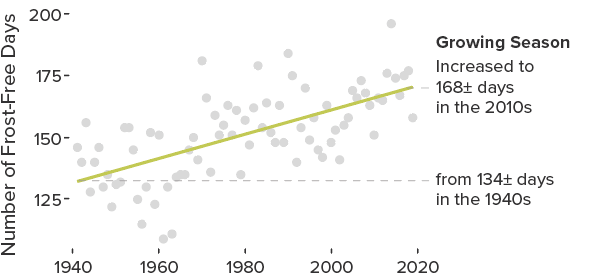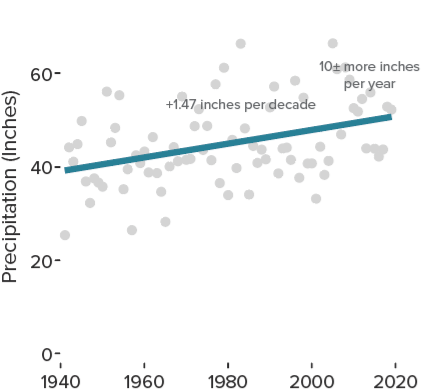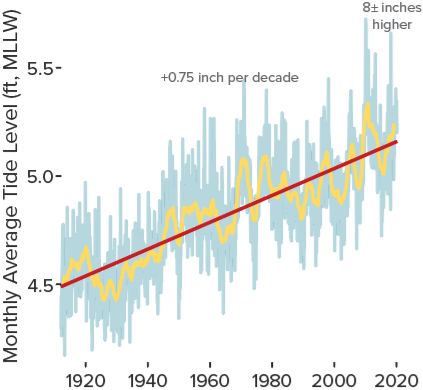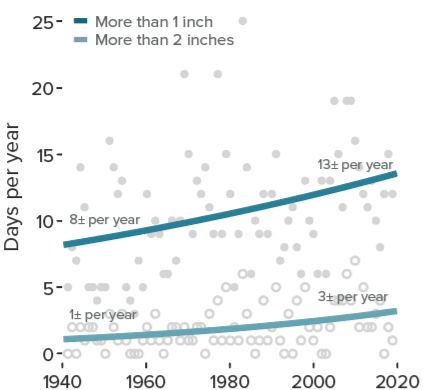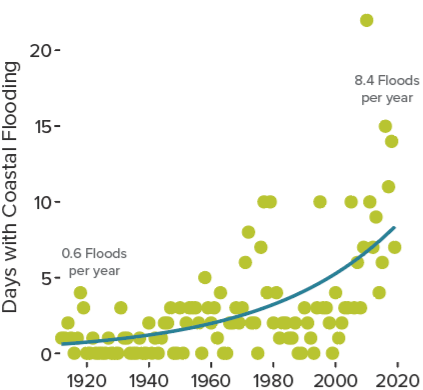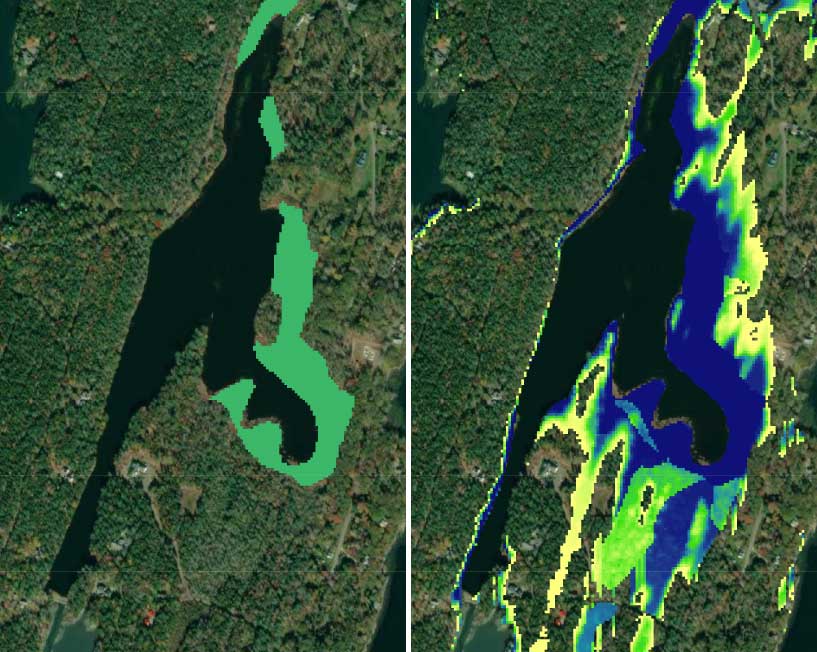Maine’s Climate Has Been Changing for Decades
Winters Have Become Warmer, and Rainfall More Intense, as Sea Level Has Risen and High Tide Flooding Increased
WHY IT MATTERS
As our climate changes, it will continue to shape the Bay, its people, communities, and natural landscape. Climate change will also exacerbate other ongoing issues such as water quality and habitat degradation. As storms become more severe, river towns and coastal communities are at greater risk of flooding. Increased rainfall delivers not only more fresh water but also more pollutants to the Bay, and warmer waters mean our lakes and the Bay are more vulnerable to those pollutants. Warming climate on land brings health risks, while a warming ocean shifts the range and abundance of marine organisms, changing fisheries and altering coastal economies. Gradually rising seas mean that monthly extreme high tides inundate waterfront infrastructure such as piers and coastal roads more frequently. Rising seas also threaten salt marshes, eelgrass beds, tidal flats, and other coastal habitats.STATUS & TRENDS
A NOAA weather monitoring station set up eighty years ago at what is today the Portland International Jetport is still in operation, providing a decades-long record. While the record shows substantial year-to-year variability, long-term trends are clear. Overall, conditions are warmer, especially in the winter, and wetter than in the past. Ocean data collected over the past century at Portland Harbor show a rising sea level.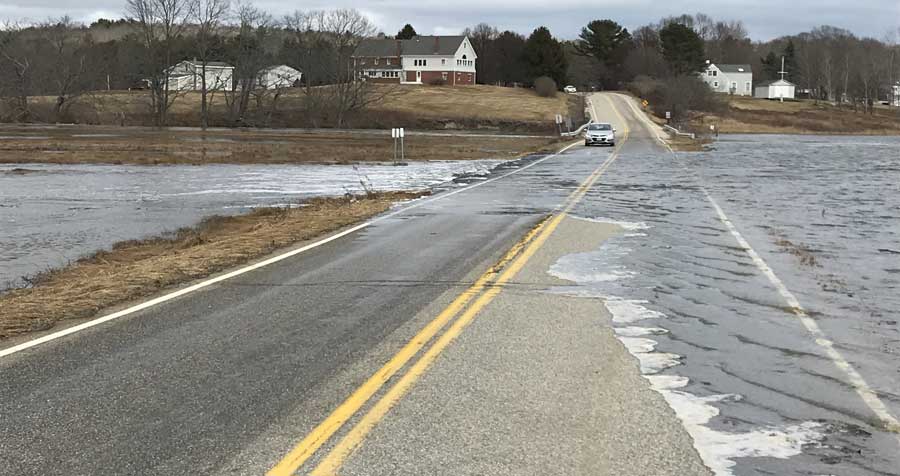
Warmer Years and Winters
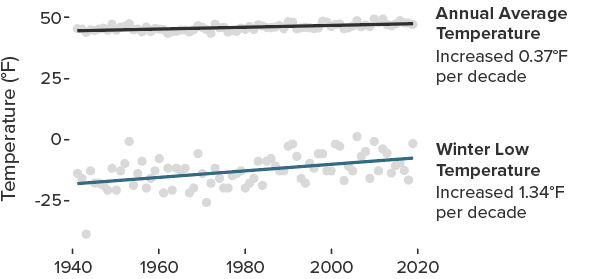
Fewer Cold Days
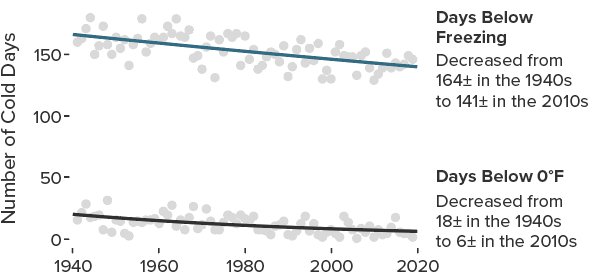
Longer Growing Season
Effects of Sea level rise on Coastal Habitats
Coastal habitats occur in a narrow range of elevations. Eelgrass grows only in shallow water. Tidal flats form principally in the lower intertidal zone. Tidal marshes develop in the upper intertidal zone.
Sea level rise, therefore, will shift the location and size of coastal habitats; just how is an area of active research. Impacts of sea level rise depend on many factors, especially intertidal elevations and the rates of sea level rise and sediment accumulation.
Researchers have looked carefully at the likely impacts of sea level rise on tidal marshes, yet studies of the effects on other coastal habitats lag.
Models suggest that, for most of this century, many of Casco Bay’s larger tidal wetlands will “migrate” into adjacent freshwater wetlands and forests. Losses of tidal marsh to submergence and erosion at their seaward margins are likely to be more than balanced by expansion into adjacent low-lying areas. Elsewhere, rising seas will squeeze tidal marshes against steep slopes or developed areas, leading to losses.
The net effect is difficult to predict and may depend on actions and polices that facilitate marsh migration. In particular, by protecting low-lying areas adjacent to tidal wetlands today, we can ensure that tidal wetlands have somewhere to expand into decades from now.
Existing and Predicted Tidal Marsh
successes & challenges
- Changes in Maine’s climate will continue for many decades and become more disruptive, particularly if global greenhouse gas emissions do not decrease. Under some scenarios, Maine’s climate at the end of the century may resemble the present-day climate of Maryland.
- The state, through the Maine Climate Council, is developing plans to reduce greenhouse gas emissions and to help Maine communities, businesses, and residents adapt to climate change.
- The cities of Portland and South Portland are leading local efforts to advance energy efficiency, alternative energy development, and adaptation to climate change through the One Climate Future initiative.
- Many costs of climate adaptation, such as emergency response, and repairing or upgrading infrastructure, will fall on municipalities, often already strapped for cash.
View a PDF version of this page that can be downloaded and printed.
View references, further reading, and a summary of methods and data sources.
STATE OF CASCO BAY
Drivers & Stressors
What’s Affecting the Bay?
Human Connections
What’s Being Done?
If you would like to receive a printed State of Casco Bay report, send an email request to cbep@maine.edu.
This document has been funded by the U.S. Environmental Protection Agency under Cooperative Agreements #CE00A00348-0 and #CE00A00662-0 with the University of Southern Maine.
Suggested citation: Casco Bay Estuary Partnership. State of Casco Bay, 6th Edition (2021).
